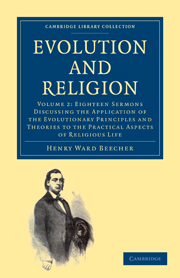Book contents
- Frontmatter
- Contents
- INTRODUCTORY: THE BACKGROUND OF MYSTERY
- I THE MANIFOLD CHRIST
- II THE CONVERSION OF FORCE
- III THE DRIFT OF THE AGES
- IV THE HIDDEN MAN
- V THE REST OF GOD
- VI GOD'S LOVING PROVIDENCE
- VII THE NEW TESTAMENT THEORY OF EVOLUTION
- VIII GOD'S GOODNESS MAN'S SALVATION
- IX POVERTY AND THE GOSPEL
- X GOD IN THE WORLD
- XI JESUS THE TRUE IDEAL
- XII THE GROWTH OF CREATION
- XIII THE BATTLE OF LIFE
- XIV THE LIBERTY OF CHRIST
- XV CONCORD, NOT UNISON
- XVI LIBERTY AND DUTY OF THE PULPIT
- XVII THE VITALITY OF GOD'S TRUTH
II - THE CONVERSION OF FORCE
Published online by Cambridge University Press: 29 August 2010
- Frontmatter
- Contents
- INTRODUCTORY: THE BACKGROUND OF MYSTERY
- I THE MANIFOLD CHRIST
- II THE CONVERSION OF FORCE
- III THE DRIFT OF THE AGES
- IV THE HIDDEN MAN
- V THE REST OF GOD
- VI GOD'S LOVING PROVIDENCE
- VII THE NEW TESTAMENT THEORY OF EVOLUTION
- VIII GOD'S GOODNESS MAN'S SALVATION
- IX POVERTY AND THE GOSPEL
- X GOD IN THE WORLD
- XI JESUS THE TRUE IDEAL
- XII THE GROWTH OF CREATION
- XIII THE BATTLE OF LIFE
- XIV THE LIBERTY OF CHRIST
- XV CONCORD, NOT UNISON
- XVI LIBERTY AND DUTY OF THE PULPIT
- XVII THE VITALITY OF GOD'S TRUTH
Summary
“Now we exhort you, brethren, warn them that are unruly, comfort the feeble-minded, support the weak, be patient toward all men.”
—I Thes. v.: 14.The law of force in matter is universal, and in regard to inorganic matter imperative. In regard to organic matter in the lower forms, as in the vegetable kingdom, and in regard to the lower forms of animal life, the law of force is supreme. The grand law, to which nature witnesses, is that the strong prevail everywhere. In all the under kingdom of organic life, vegetable or animal, the weak go to the wall. And there has been pointed out a certain benevolence in that, inasmuch as the tendency is in all the lower forms of life to extinguish the weak and leave only the strong, the full developed, the vigorous, the healthy, to propagate their species. And yet if that law were carried straight on through, as partially as it has been in society since man has been developed, it would be to the end, as it has been, a law of cruelty against which it would seem to be almost impossible to develop Christian experience and faith.
But, then, there is beginning, low down, yet another tendency, namely, one not to extinguish the law of force, but to convert it to beneficence and to make it the guardian law, and not the destroying.
- Type
- Chapter
- Information
- Evolution and Religion , pp. 188 - 203Publisher: Cambridge University PressPrint publication year: 2009First published in: 1885



